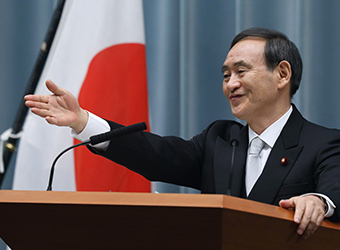Japanese Chief Cabinet Secretary conceded the Trans-Pacific Partnership (TPP) trade deal faces an uphill battle without the United States, even as Tokyo pressed other member countries to ratify the pact to keep the pressure on Washington, suggesting that Tokyo would work hard to convince U.S. President Donald Trump to rethink his stated opposition.
In an interview with CNBC, Yoshihide Suga, Prime Minister Shinzo Abe’s top adviser said the Japanese government would properly assert itself in trade talks, to prevent a move towards protectionism.
“A TPP without the U.S. would be incredibly difficult, but we do have a window until 2018, when the treaty needs to be ratified,” Suga said. “We believe we still have an opportunity to convince the U.S. about the importance of free trade.”
Trump has already vowed to withdraw from the TPP in the first 100 day of his administration, calling the pact “a potential disaster” for the U.S. In his inauguration speech, Trump reiterated his call for an “America first” policy, saying every decision on trade as well as taxes and foreign policy, would be made to benefit American workers and American families and has already moved to start potential renegotiation over the existing North American free Trade Agreement 104233449 (NAFTA).
Still, Abe, who has championed the regional trade pact, has pushed Japan to ratify the treaty, becoming the first of a dozen member countries to complete domestic procedures required for the pact last week.
Challenges over the TPP come, as Japan finds itself in the crosshairs of the new U.S. administration. Trump has singled out the country, alongside China and Mexico, for its trade deficit with the U.S. He’s also targeted Toyota, threatening to slap the Japanese carmaker with a “border tax,” if it moves forward with plans to build Corolla cars in Mexico. That has rattled Japanese lawmakers, who consider the U.S. Japan alliance a cornerstone of regional stability.
“Japanese investments into the United States top $410 billion and create 800,000 jobs” Suga said. “This is the reality of what’s happening right now. As long as we convey that clearly, we believe that there will be a clear understanding on the economic front.”
Analysts have pointed to a slight possibility that the TPP could proceed even without the U.S.
“I’m not saying it’s going to happen, but there is a very remote chance we could have the other countries of the TPP saying ‘let’s go ahead,'” Alex Capri, a visiting senior fellow at National University of Singapore’s business school, told CNBC’s “The Rundown” on Monday. “There are some loopholes that would have to be closed, but it’s possible.”
He noted that the deal’s other 11 parties may want to proceed as unlike most free-trade agreements, which tend to be shallow, the TPP was a deeper agreement addressing non-tariff barriers, such as intellectual property. Because the U.S. market was already very open and generally already had adopted such measures, these provisions would have impacted it less, he said.
“It’s really the other 11 countries that would have benefited,” he said, noting that if the deal goes forward without the U.S., American companies would be at a competitive disadvantage in the region.
Trump has also called on Japan to shoulder more of the cost, when it comes to hosting the roughly 50,000 American troops based in the country, while suggesting the country arm itself with nuclear weapons. Suga has maintained that Japan pays more than half the costs. He said he discussed the importance of the U.S. Japan Security Treaty with National Security Advisor Michael Flynn, in a 90-minute meeting prior to the November election.
“I do believe the two countries can have an appropriate conversation about the role that Japan is playing in reality, including cost. We need to take this step by step,” Suga said.
Japan faces increasing uncertainty in the region, following reports last week, that North Korean leader Kim Jong Un was preparing to test-launch an intercontinental ballistic missile, to provoke the new Trump administration.
Suga refused to comment on North Korea’s weapons capability, but said the threat from Pyongyang had reached a new level, citing the significance of two nuclear tests last year.
“Up until now, the tests were conducted once every three years,” Suga said. “We believe the situation is becoming increasingly dangerous. Amid that threat, our country, in addition to the U.S., and South Korea – the alliance must work together to counter this.”
Source: CNBC


